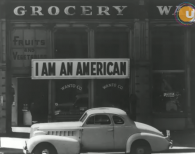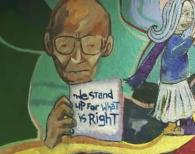"In the long history of our country's constant search for justice, some names of ordinary citizens stand for millions of souls. Plessy, Brown, Parks ... to that distinguished list, today we add the name of Fred Korematsu."- President Bill Clinton, in his remarks before bestowing Korematsu with the Presidential Medal of Freedom in 1998Fred Korematsu’s legal case against the United States government for its internment of Japanese-Americans during World War II was stopped cold by the Supreme Court in 1944. But his fight against intolerance, and his legacy as a champion of civil rights, would last for the rest of his life.
A fugitive after attempting to escape interment, Korematsu was arrested and spent the rest of the war in a camp in Topaz, Utah. He experience racism while trying to find a job after the war, and he was shunned by other Japanese-Americans who feared that his actions would threaten their attempts to be seen as loyal citizens. But Korematsu persevered, and his conviction was overturned in 1983 with help from a UC San Diego professor and a team of lawyers.
On Jan. 30, 2011, seven years after he died at age 86, Fred Korematsu Day was celebrated for the first time in California. The holiday is the first official day named after an Asian American in the U.S.
fred korematsu

"We are all Americans in this country."—Fred Korematsu (1919-2005)
When Japanese-Americans were sent to camps during World War II, Fred Korematsu refused to go, saying, "I am an American." His 40-year fight became a symbol of equality and freedom. A few days ago, California celebrated its first Fred Korematsu Day and Feb. 19 marks the 69th anniversary of Executive Order 9066 that legalized the internment. This is Korematsu's story, produced for UNITY Lab.
The U.S. Supreme Court upheld charges against Korematsu in 1944 and it would take nearly 40 years for his charges to be formally overturned. Korematsu said, "It was a great victory for all Americans and all Asians in this country, that this will never happen again."
